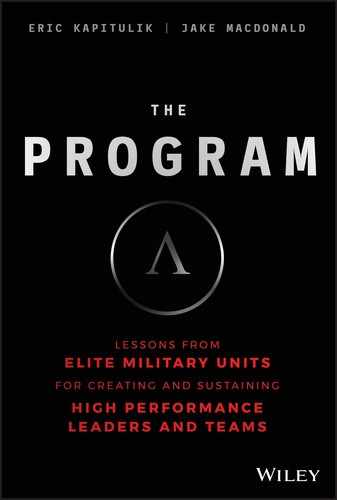27
What Is and Isn’t Leadership, and Who Are and Aren’t Leaders?
TEAM LEADERS ARE held to two standards: Accomplish the mission, and take care of your teammates. Great team leaders are those who consistently do so. We will discuss these standards in much greater detail in the following chapters. They are incredibly powerful and their achievement is critical to any organization’s long-term success, but before discussing them, we must first define what is and what isn’t leadership and who are and who aren’t leaders. Most of us can’t do so, which unfortunately ensures that individuals who should not be in vitally important leadership roles are nevertheless placed there. More egregious, our inability to effectively define true leadership, and to determine what individuals should be developed and selected for even greater responsibility, leads to mission failure, and ultimately to the collapse of entire organizations. Best-selling author and leadership expert John Maxwell famously wrote, “Leadership can be defined by one word—influence.” Influence is leadership, but it does not necessarily make you a leader. A leader has the desire and ability to use that influence on those around them. Very few people, of any age, understand this. During any televised sporting event, announcers will inevitably praise the highest-scoring athlete, as they score more and more points, for “the great leadership they are showing.” The same is true in our schools: teachers and principals consistently praise their smartest students for their leadership. In corporate America, CEOs and presidents highlight the leadership of their top-grossing salespeople. Furthermore, the most prolific scorer, the smartest student, and the highest-grossing salesperson are all anointed as the leader because of their performance. This is a mistake. Although they are exceptional athletes, students, and salespeople, and have influence because of it, they often lack a desire or an ability to be a leader—both of which are required to be one. Many coaches and corporate bosses fail to remember this. We all want our best performers to be our best leaders, but unless those highest performers have the desire and ability, they will never be leaders. As leaders, we compound this mistake when we force them into a leadership role. This inevitably leads to frustration in both parties, and often to a decrease in the individual’s performance. Unfortunately, we have seen this occur countless times. Coaches make their highest scorer a captain and then demand the person act like a leader. Instead they not only don’t do so, they also stop scoring as much. Parents and school administrators force young people into leadership roles in their school and their grades suffer.1 Corporate presidents tend to promote their best salespeople to regional sales director, and their individual sales—as well as the entire region’s sales—drop immediately. Furthermore, we gain influence (leadership) in one of two ways: through our title and through who we are (our Core Values, our personality, our work ethic, our talent, our intelligence, etc.). All things being equal (which they rarely are), a captain in the Marine Corps has more influence than a private, a head coach has more influence than an assistant coach, and a CEO has more influence than a regional director. Even though who we are gives us far more influence, titles do matter. Giving someone a title will give them more influence. That can be a great thing if they use that additional influence positively. It can also be very bad if they use it negatively. We must always remember to ask ourselves: if we promote, do we truly want that individual to have the greater influence that comes with the title? You may have someone in your organization who does not meet any of the standards of a leader discussed later in this section, but they are influential and they have a desire and ability to use that influence. Typically, their influence stems from their talent and their ability is based on their charismatic personality. Maybe they know where the best party is on Saturday night. A parent, head coach, principal, or CEO may not consider them a leader, but their peers follow them. As leaders of our organizations, we must recognize that such people are leaders, despite our desire that they not be. They may be leading our team in the wrong direction, but they are still leaders. If you don’t want them to be leaders on your team, either you change them drastically, or you get rid of them. Coaches and corporate presidents can choose individuals on their team to fill certain leadership roles and provide the corresponding titles (Team Captain, Regional Director, etc.). The team decides who the leaders are, though. Individuals who don’t embody our team’s culture are dangerous to mission accomplishment. If they also have a desire and ability to negatively influence other members of the team, they are deadly. In the Marine Corps, our superiors provide us with fitness reports throughout our careers that serve as performance reviews. One of the blocks in the fitness report is the “Billet Description,” a basic description of the current job you are performing. The first line of any leader’s billet description is always “responsible for everything that happens or fails to happen in their unit.” Now that we have described what is and isn’t leadership and who is and isn’t a leader, we must highlight the two standards to which team leaders are held: (1) accomplish the mission, and (2) take care of your teammates. Both will be discussed in great depth after an explanation of what exactly a “mission” is.Note
